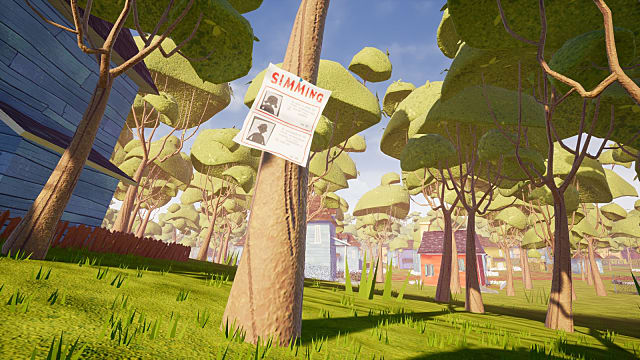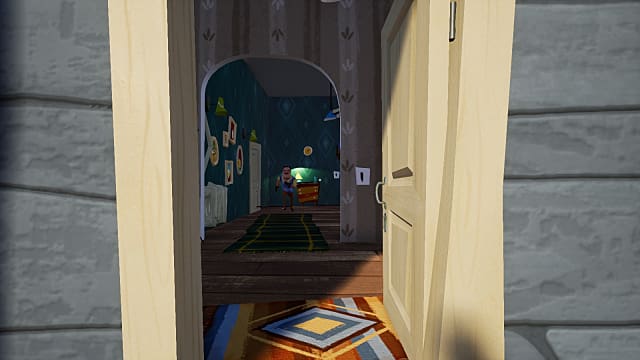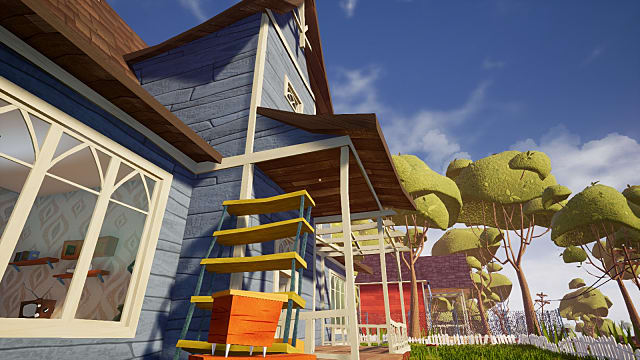While the controls are still iffy, this stealth survival game has seen the world and puzzles polished to a very satisfying shine!
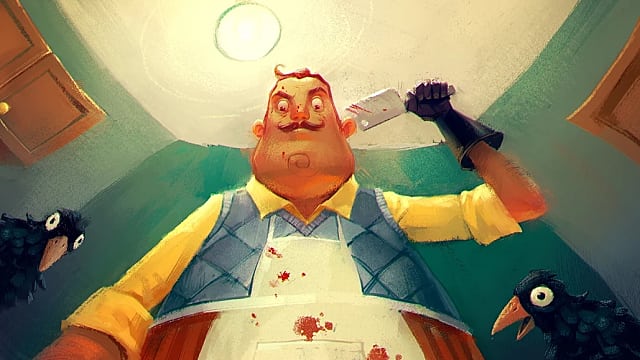
While browsing through the toys at Gamestop last week in search of Christmas gifts, I couldn't help but notice a Hello Neighbor plushie prominently displayed on prime shelf real estate.
I think it's safe to say that Early Access and crowd funding have made a pretty serious dent in the industry if an indie game that wasn't even out at the time and had only been played in alpha somehow got its own merch in major retail stores.
More than a year and four alpha builds after first getting noticed, we're finally able to get our hands on the full, complete version of Hello Neighbor. The end result is a pleasure for those who have been following this eye-catching game since the early days, and I'm excited to report more of the horror elements have returned after going missing in recent builds.
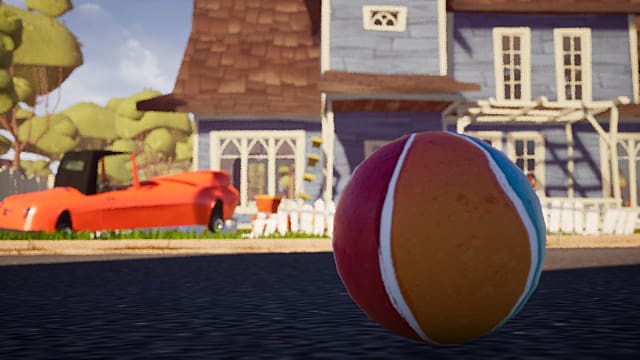 When a ball slowly rolls into frame in front of a menacing house,
When a ball slowly rolls into frame in front of a menacing house,you know it's about to go down for real
Another Day In Paradise
The art style and color palette may seem an odd choice for the game's horror concept at first, as Hello Neighbor is sort of like a brightly colored, '70s-drug fueled version of Tom Hanks classic The Burbs (which is about to be re-released on BluRay -- coincidence or dark providence?).
That nightmarish Dr. Seuess-on-acid house from the previous alpha build is gone in the full version (well, in Act 1 anyway), replaced by a warm, quiet neighborhood where nothing bad could ever... and oh god we've been kidnapped.
Long time alpha players will be very pleased with the story elements wrapping everything together now, and there's an excellent mashup of style and substance here, like seeing the game world from a little kid's short, slanted, and dyslexic point of view.
Now more than just random breaking and entering for fun and profit, there's a reason for everything going on, with plenty of twists and turns you won't expect. Get ready to jump, scream, and maybe even feel a little bad for the villain.
Stealth And Puzzles
The bulk of the game is figuring out how to work your way past the observant neighbor to unlock new secrets in, around, under, and even above the main house.
There's quite a lot of content to explore in that one location, and plenty of clever puzzles to work out as you try to reach a closed off area, nab a key, access an object, and so on.
While the puzzles can be difficult, they aren't ever completely illogical or devoid of a clear solution. If you take the time to explore and think about how items in the game are connected, it won't be too frustrating to reach the next area.
The opening cinematic for instance actually shows you exactly what object you need to get and how to get there to work through Act 1, but if you aren't looking for the clues, you could easily miss what's right in front of your nose.
Many of the same types of puzzles and objects from the alpha builds return, but they are arranged in different ways now so you can't just repeat what you've done before. There's still the magnet gun for instance, and having to use boxes to create ladders or break windows, but the layout is completely different.
Actually getting past the neighbor and unlocking the basement, which was previously the ultimate purpose of the alphas, is now just the beginning. There's much, much more to explore now as the game builds on previous concepts in each successive act.
Along the way new players will have to learn from trial and error how to draw the neighbor away from unexplored areas, using a combination of stealth and speed, and open new routes or close off old ones so he can't catch you as easily.
The whole experience is wrapped up in fabulous sound effects and a wonderfully odd visual style, like Wallace and Gromit collided with We Happy Few. Style is easily the game's strong suit, and it's used to stunning effect in several notable locations.
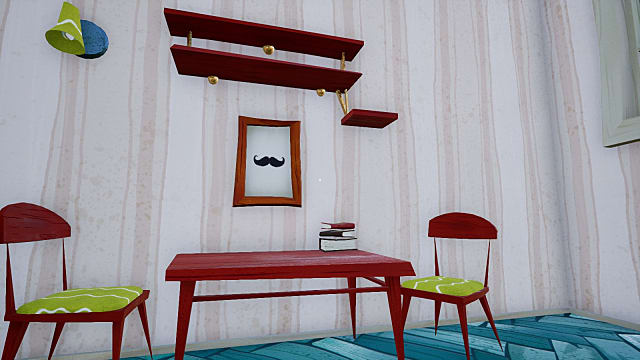 A table missing its family, centered around a painting of a mustache with shelves for platforming... that's Hello Neighbor in a nutshell!
A table missing its family, centered around a painting of a mustache with shelves for platforming... that's Hello Neighbor in a nutshell!The Bottom Line
Having played the game in various early iterations and watched new players give the full build a go, I'm left wondering if those who devoured the alphas will get more out of Hello Neighbor than anyone just now jumping into the fray.
In particular, there's a major sense of satisfaction just in seeing a lot of the concept art come to life in scenes that weren't present in the previous builds. TinyBuild Games also utilizes a really clever use of player knowledge on gameplay mechanics to give you a sinking sense of despair when you reach the end of Act 1. You can practically hear Bender saying “well, we're boned” when you reach the end, and then there's an unexpected twist and satisfying opening to the second act.
Totally new players who didn't puzzle things out in alpha, on the other hand, will probably be more than a little lost. Sadly, there are still some game mechanics not explained well, like that you have to hold E to pick up objects, not just press it, or that the longer you hold right click the farther and harder an object is thrown.
Some of the controls themselves are also still a bit wonky -- simply figuring out how to jump up objects without bouncing off takes some major effort.
Despite all the alphas and feedback, there are still some bugs as well. For example, if you are noticed and start a chase, but then quickly manage to get in a spot where the neighbor can't reach you -- like up on a segment of roof – the game will crash as the neighbor tries to go somewhere he can't physically access over and over.
Furthermore, there's the issue of game length to keep in mind. Depending on how good you are at puzzle solving (or how often you are referencing guides), we're talking about 5 – 8 hours or so of content. While that's on par with any given shooter's campaign these days, keep in mind there aren't any other game modes.
Replay only involves mopping up remaining achievements you might have missed or trying to tackle the challenges in different orders. The AI does change up its tactics based on how you play, so there's different ways to be caught or successfully hide, but probably not enough to warrant playing through more than once or twice.
There are plenty of differences between each act's layout and puzzles, though, so its not the exact same experience all the way through and has plenty of variation.
While the game is short and lacking in clear direction, it does excel on nearly every other front. The visual aesthetics are eye-popping, the story is intriguing, and the stealth/puzzle mechanics are satisfying. For an indie excursion that tries something unique, Hello Neighbor is mostly a success, and well worth checking out.
Our Rating
